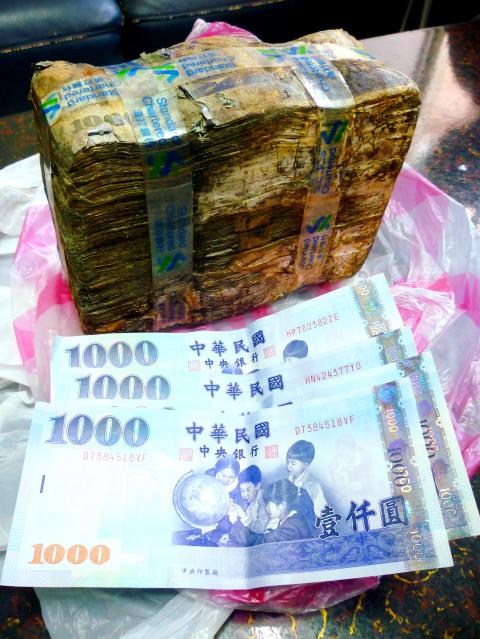A 90-something-year-old woman living in Hsinchu County withdrew NT$1,000,000 two years ago and then forgot that she hid the thick pile of NT$1,000 banknotes in the kitchen cupboard. A family member recently discovered the money while cleaning up the kitchen. The banknotes are still intact, but are damaged and moldy. They were forced to seek help from the Investigation Bureau’s Hsinchu County Field Station since all the banks they went to refused to exchange the money for new bills.
The elderly woman refused to be interviewed, but her son-in-law, surnamed Huang, said she is financially independent, and because of her old age and illiteracy and unwillingness to bother the younger generation to go to the bank with her, she periodically withdrew money so that she would have some cash readily available. It was her habit to hide money in various places around the house without letting her family know.
When family members were recently cleaning up the kitchen, they found an ordinary plastic bag in one corner of the cupboard where plates and food were stacked. Peeking inside the bag, they were surprised to discover a pile of NT$1,000 banknotes 18cm high, with the Standard Chartered Bank seal still intact. They assumed that she must have forgotten the pile of money was inside the cupboard. They did not break the seals because they were afraid of causing further damage to the banknotes. It was only after checking her bankbook they conjectured that the total sum might be around NT$1,000,000.

Photo: Liao Hsue-ju, Taipei Times
照片:自由時報記者廖雪茹
Huang said they took the banknotes to E.Sun Bank to exchange them for new ones, but that the banknotes were too damaged and moldy, not to mention stuck together. The clerk refused to exchange them, so they took the pile of money to the Bank of Taiwan, where they were advised to take the money to an Investigation Bureau field office to authenticate the money in order to replace it with new banknotes according to the Central Bank’s standard procedure for dealing with damaged banknotes.
Huang applied to have the money authenticated at the Investigation Bureau’s Hsinchu County Field Station where it was determined that humidity in the kitchen had damaged the bills, that only a small amount had been damaged, that moths had not eaten any of them, and that most of the banknotes were intact.
(LIBERTY TIMES, TRANSLATED BY TAIJING WU)
新竹一位九十多歲老太太,二年前提款新台幣一百萬元回家,厚厚整捆千元鈔藏在「菜櫥仔」竟忘了,家人最近整理廚房意外發現;紙鈔大致完整,但外觀污損、發霉,銀行不敢收,家人因此求助新竹縣調查站鑑定。
老太太不願受訪,但她的女婿黃先生說,岳母經濟獨立自主,但因年老、不識字,又不想麻煩晚輩陪她跑銀行,常一次領一筆回家,以便隨時取用,而她習慣東擺一點、西藏一些,也沒讓家人知道。
日前家人清掃廚房,在堆放碗盤、乾糧的「菜櫥仔」角落,翻到一只普通塑膠袋,一看竟是整捆千元鈔,厚達十八公分,有渣打銀行的完整封條,猜想必是阿嬤放到忘記,因怕損及鈔票,不敢拆封,只核對存摺,研判是新台幣一百萬元。
黃先生說,家人拿去玉山銀行換新鈔,但紙鈔有點污損、發霉,且每張都黏在一起,行員不敢收兌;家人去台灣銀行,行員建議送調查站鑑定,確認為可辨識真鈔,才能依中央銀行處理破損紙幣的標準兌換新鈔。
於是黃先生將鈔票送新竹縣調查站申請鑑定,縣調站研判,可能是廚房潮濕,造成鈔票外觀污損,僅一小疊有破損,沒被蛀蟲啃食,大致完整。
(自由時報記者廖雪茹)

As the priest Antonius Hambroek stood in the dim chamber of Fort Zeelandia, his eldest daughter clung to him, her voice trembling. “Father, don’t go. They’ll kill you, and what will become of Mother and my sisters?” Outside, the sounds of Koxinga’s relentless canon siege boomed through the fortress. The defenders were on the brink of collapse. Starvation gnawed at their resolve, and the air carried the acrid stench of spent gunpowder and rotting flesh. Dutch reinforcements from Batavia had failed to arrive, leaving the garrison isolated and hopeless. Hambroek’s face was calm, though sorrow weighed heavily on his

As we bundle up in thick coats to stay warm during the winter, there is a population that has already adapted to extremely low temperatures. These people live in the remote city of Yakutsk, the coldest city on Earth. Yakutsk is situated in the heart of Siberia, which is the capital of the Sakha Republic in Russia. This historic mining city began to flourish in the 19th century following the discovery of gold deposits. Given its construction on permafrost, the average temperature in the city remains below 0°C for over half the year, with winter temperatures dropping to an astonishing -50°C.

The Dutch introduced the Indian mango (Mangifera indica) to Taiwan in the 17th century. It is a green-skinned mango with thick fibers that get stuck in the teeth, but it boasts a rich aroma and a unique taste. In 1954, Taiwan’s Council of Agriculture introduced several mango cultivars from Florida, USA, including the Irwin, Haden, and Keitt varieties. After seven years of testing and domestication, the Irwin variety was chosen for promotion. Years later, the sample saplings started to bear fruit. These mangoes were large, with thin, vibrant red peels and golden pulp. The Irwin mangoes were mouth-wateringly sweet and

對話 Dialogue 清清:今天中午我要多吃一點,不然晚上可能會吃不飽。 Qīngqing: Jīntiān zhōngwǔ wǒ yào duō chī yìdiǎn, bùrán wǎnshàng kěnéng huì chībùbǎo. 華華:怎麼了?為什麼會吃不飽? Huáhua: Zěnmele? Wèishénme huì chībùbǎo? 清清:今天大年初七,是「人日節」,傳統上結了婚的女兒要回家給父母送長壽麵,而且最好是素的,我姐姐會回來,只吃素麵,我應該很快就餓了。 Qīngqing: Jīntiān Dànián chūqī, shì “Rénrì jié,” chuántǒng shàng jiéle hūn de nǚ’ér yào huíjiā gěi fùmǔ sòng chángshòumiàn, érqiě zuìhǎo shì sù de, wǒ jiějie huì huílái, zhǐ chī sùmiàn, wǒ yīnggāi hěn kuài jiù èle. 華華:我還是第一次聽說有「人日節」呢!這是怎麼來的啊? Huáhua: Wǒ háishì dì yī cì tīngshuō yǒu “Rénrì jié” ne! Zhè shì zěnme lái de a? 清清:老一輩的人說,女媧是在第七天造出了「人」,所以今天可說是我們每個人的「生日」呢!生日快樂! Qīngqing: Lǎoyíbèi de rén shuō, Nǚwā shì zài dì qī tiān zào chūle “rén,” suǒyǐ jīntiān kěshuōshì wǒmen měi ge rén de “shēngrì” ne! Shēngrì kuàilè! 華華:你也是啊!欸?那前六天女媧都做了什麼呢? Huáhua: Nǐ yěshì a! Éi? Nà